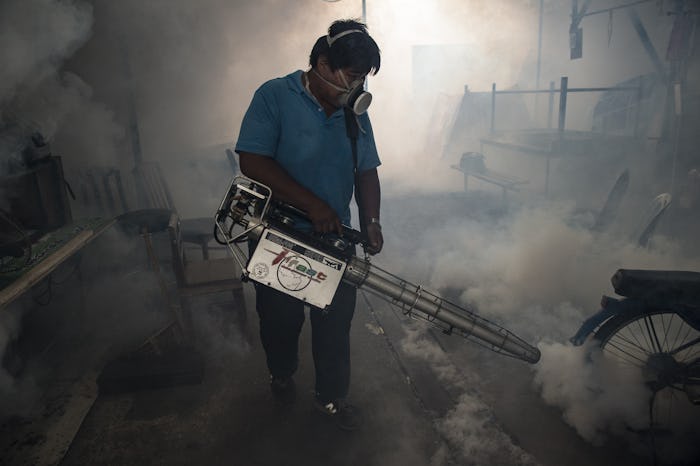Life

New Zika Antiviral Treatment Could Protect Pregnant Women & Their Fetuses
The Zika virus may not be the trending topic at the moment – let's face it, the presidential election may have something to do with that – but it's still an important public health issue. That's why scientists are still working to find an effective vaccine for the Zika virus. Luckily, recent headlines might give everyone reason to hope for some good news: A new Zika antiviral treatment that could potentially protect pregnant women and their fetuses. As of now, the antibody in question has only been tested in mice, but if nothing else, it's a start.
As The Wall Street Journal cited this week, the journal Nature on Monday published findings from a Zika-related study coming out of the Washington University School of Medicine in St. Louis and Vanderbilt University School of Medicine. Apparently, the study revealed that isolated human antibodies called "monoclonal antibodies (mAbs)," taken from people with a prior Zika infection, "markedly reduced" the infection in pregnant mice, and non-pregnant adult mice.
In a press release, Michael Diamond, study author and professor of medicine at Washington University, touched on the significance of the new study's findings. "This is the first antiviral that has been shown to work in pregnancy to protect developing fetuses from Zika virus," Diamond said. "This is proof of principle that Zika virus during pregnancy is treatable, and we already have a human antibody that treats it, at least in mice."
But as The Journal reported, the antibodies have not been tested in humans, and it could take months before that happens.
The authors of the study noted in the press release that while there are currently human trials for Zika vaccines, this study provides evidence that certain antibodies could potentially be directly administered to pregnant women to prevent the virus' transmission:
Until a human vaccine is available, it may be possible to protect fetuses by administering antibodies to pregnant women in an attempt to prevent transmission from mother to fetus. Under this scenario, a woman living in a Zika-endemic area would receive the antibodies throughout her pregnancy, starting when she first learns she is pregnant, regardless of whether she is diagnosed with Zika. Alternatively, pregnant women or their partners with acute infection could be treated with antibodies.
As the CDC explains, many people infected with Zika will have mild or no symptoms at all. While scientists continue to test for Zika vaccines, and other treatments, it's important to see a healthcare provider to confirm a Zika diagnosis (a blood or urine test) if you believe you may have been infected.
Zika can cause serious birth defects, and is associated with other disorders. The more people around the world learn about Zika and its possible treatments, the better.